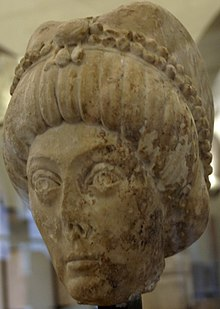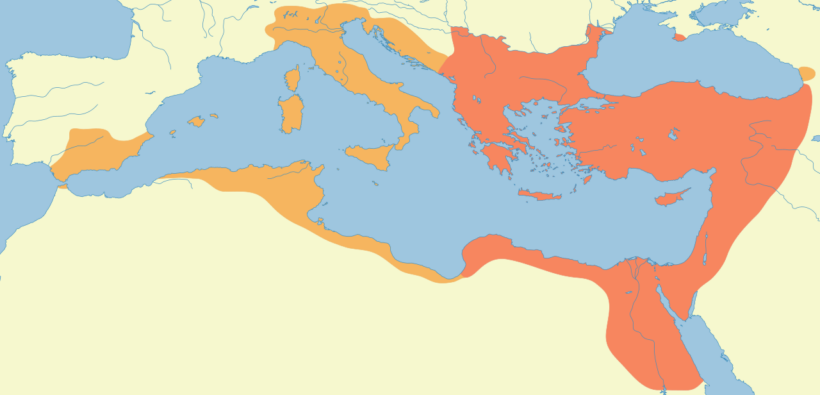
…
I didn’t hear about her in school, but read about her later, in my early 20s in a book about her remarkable life. I had paid 3 Austrian shillings (fifty cents) for the novel in an old second-hand bookstore in Vienna. The title of the paperback “Theodora, from Prostitute to Empress.”
Theodora was a remarkable woman who worked her way up from a simple prostitute to a powerful empress. She was born in the 6th century and began her career as a dancer in a theater in Constantinople. (Istanbul, Turkey).
There she met the future Emperor Justinian I, who immediately fell in love with her. Together with Justinian, Theodora ruled the Byzantine Empire and fought for women’s rights as well as against corruption and injustice within the state.

…
But Theodora was not only politically active, she also campaigned for the socially disadvantaged, and founded orphanages and hospices as well as schools for girls. Her influence on the cultural life of her time should never be underestimated – among other things, she promoted art and architecture projects such as the construction of the famous Hagia Sophia. Overall, Theodora left behind a lasting legacy – both as a strong ruler and through her numerous charitable projects during her reign until she died in 548 AD.
Theodora’s mother was a dancer and actress, while her father was a bear keeper of the Hippodrome in Constantinople. In her youth, Theodora hired herself out as an “actress” or prostitute, which enabled her to make contact with noblemen and senators. During this time, Theodora gained knowledge of reading and writing in Latin and Greek. She devoted herself to the study of old and new work and earned a reputation as an intelligent and equal examiner.
When Theodora was about 20 years old, she was taken to Alexandria by a lover, who left her behind penniless. On her own, she traveled to Alexandria in Egypt and found support in a Christian community that belonged to Monophysitism. Theodora converted to this faith.
…

…
On her return to Byzantium, Theodora met Justinian, the nephew of the reigning Emperor Justin and the future emperor. Justinian was deeply impressed by Theodora and fell in love with her. Theodora was his great love and became his equal partner. To make their marriage possible, Justin, Justinian’s uncle and reigning emperor, even changed the law. In 527 A.D. Justinian became emperor of the Roman Empire and a week later Theodora was also crowned empress.
Justinian attached great importance to the fact that Theodora was not only formally considered a co-empress, but treated as an equal to him. He considered her his God-given partner. Together, Justinian and Theodora made some decisive changes.
Theodora campaigned for the improvement of the situation of women. She made sure that the divorce laws were changed and that women were allowed to buy their own property. In addition, actresses (prostitutes) were no longer excluded. New laws regulated prostitution, and trafficking in girls was declared illegal.
Religious freedom was also important to Theodora, as there were disputes, persecution, and discrimination in Christianity due to different ideological views. Theodora protected above all the Monophysites, a Christian religious group that emerged in the 5th century. The Monophysites believed that Jesus Christ had only a divine nature and not a human nature. This belief is related to the devotion of Mary as the “Theotokos” or “Mother of God” since she was considered THE Mother of God. The Monophysites argued that the divine nature of Jesus overwhelmed human nature and that Mary was therefore not only the mother of Jesus, but also the mother of God. This led to controversies within the Christian Church and to the emergence of different theological currents.
In Theodora’s time, the tradition of the ancient Near Eastern mother-child myths and the myth of the “eternal virgin” experienced enormous popularity. Churches were built everywhere in honor of Mary and impressive processions were held with huge statues of Mary, as they were believed to emanate a protective energy.
Theodora had numerous churches and monasteries built. They housed masses of monks and believers in the Hormisdas Palace, once so many that the floor of the palace collapsed. They also welcomed refugees from various warlike conflicts in the palace, making Constantinople a truly cosmopolitan city.
…

Roman Empire under Justinian I and Theodora
The many new construction projects and the conquests of Justinian were financed by high tax collections, which ultimately led to the so-called Nika Uprising, a popular revolt. When Justinian wanted to admit defeat and flee, Theodora saved the throne with an impressive speech. Justinian then decided not to give up, but to fight despite the hopeless situation, and a bloodstained victory against the rebels was achieved.
Theodora was one of the most powerful women who had a decisive influence on European history. Although there are few reports about her life, the partisan historian Prokop shaped the image of her in historiography for a long time. He portrays the empress in a decidedly negative way providing little substance. In later stories, on the other hand, Theodora is declared a saint, which almost completely devalues Procopius’ statements.
I find her to be fascinating. I wish more would be known about her and her life, and I hope she will someday find her final resting place in the history books of young students all over the world.
The Empress Theodora, was a remarkable woman, who achieved so much, yet she is fairly unknown. I only learned about her because as a young student, I couldn’t afford new books.
…



It’s worth reading, motivated by the story , it brings hope and shows the direction
LikeLike
This is a great story! Thanks for getting this ‘out there’ where we could treasure it.
LikeLiked by 1 person
Thank you for reading it.
LikeLiked by 1 person
Fascinating post. I might propose a book about her at our next book club
LikeLiked by 1 person
Oh, that’s a wonderful idea.
LikeLiked by 1 person
Thanks for sharing this story! I know about Theodroa and Justinian when doing research for my post about Istanbul. But I didn’t know that her early life was so difficult. Her rise to power is fascinating indeed.
LikeLiked by 1 person
You are the first one who knew about Theodora and Justinian. Isn’t Istanbul a fascinating city? Thank you for reading, and thank you for commenting.
LikeLiked by 1 person
I would say Istanbul has a chaotic beauty 🙂 Remarkable but somewhat disorganized.
LikeLiked by 1 person
So true!
LikeLiked by 1 person
What a fascinating read, thank you!
LikeLike
Fifty cents well spent! Thank you for this informative summary of her life and influence. Inspiring and intelligent women left out of historical textbooks is a common story, sadly. A frustrating fact of public education. I did my best to enhance the standard curriculum with women who deserved the recognition, rarely received.
LikeLiked by 1 person
It’s like that in every country and I hate it. It’s like men feel threatened by our accomplishments and perhaps some really do.
A friend of mine believes the new abortion laws in the US are only put in place to keep us women away from leading positions. Like every joke I suppose there is a kernel of truth in it.
LikeLiked by 1 person
Truth. The kind of annoying kernel that get stuck in your tooth!
LikeLike
Not a big surprise I was never taught this in school. In US schools there is very little for European history taught, Sad really. Thanks for sharing her story!
LikeLiked by 1 person
I went to school in Germany and I had never heard of her either.
LikeLike
She was indeed remarkable
LikeLike
I was familiar with Theodora, but appreciate you refreshing her story for me. She was a remarkable woman. 🙂
LikeLike
Interesting… like the Mother of God stuff!…. 😉
LikeLike
It’s interesting to know where so much of the religious believes and customs come from, also how much they changed from Thor to Jesus. Who knows what they might believe in 2000 – 3000 years from now.
LikeLike
An excellent introduction to a lady who I knew nothing of. Thank you Bridget.
LikeLiked by 1 person
Most people have never heard of her, which is a shame. I remember reading the novel about her and then I looked her up at the library.
There are a lot of great people, women and men, in history who are kind of forgotten, even though they accomplished great things.
LikeLiked by 1 person
The woman behind the man! Good that she had a mind of her own, Bridget. Few of the Emperor’s wives left any impression, but there’s so much that we don’t know.
LikeLiked by 1 person
There are a few I know about, like Empress Elizabeth (Sisi). I need to write about her.
LikeLiked by 1 person
Fascinating.
LikeLiked by 1 person
I couldn’t agree more. Just the thought that 1500 years ago a woman already fought for women’s right is remarkable and a bit shocking. Why are we backpaddling?
LikeLike
Thanks for making us all aware of this remarkable woman. It just goes to show what can be done if you are determined and hopeful. Have a great day. Allan
LikeLiked by 1 person
Theodora was ahead of her time and it seems so was her husband. I wish she would be known more -and better.
LikeLiked by 2 people
What an amazing woman! Thanks for this information. I have always been impressed with Boadicea, a queen of the ancient British Iceni tribe, who led a failed uprising against the conquering forces of the Roman Empire in AD 60 or 61.
LikeLiked by 3 people
You are very welcome. Thank you for reading.
I have to admit I n ever heard of Boadicea, now I will do my homework.
LikeLike
Not someone I’ve heard about before, how interesting to hear her story! 🙂
LikeLiked by 3 people
Most people have never heard of her. I stumbled over her story by accident
LikeLiked by 1 person